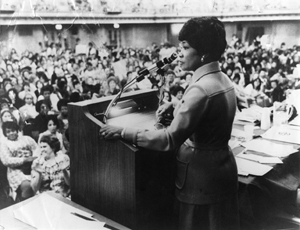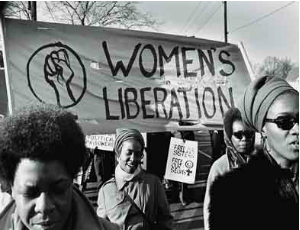This month marks the 100th anniversary of the 19th Amendment, which was ratified August 18, 1920, and guaranteed the right to vote for women. The amendment passed due to the determination and hard work of a group of women activists known as suffragists.
In celebration of women's activism, let's explore Chicago's strong legacy of Black female activists. Here's a look at a few women whose archival collections are housed at Chicago Public Library’s Vivian G. Harsh Research Collection of Afro-American History and Literature at Carter G. Woodson Regional Library. This is the largest repository of African American history and literature manuscripts in the Midwest.
Rev. Addie Wyatt: Union and Civil Rights Activist
Addie Wyatt (1924-2012) was a meatpacking worker and union activist in the 1940s. Her determination to fight for social justice led her to union leadership roles, culminating in her election as the first African American woman vice president of the Amalgamated Meatcutters Union. She was a founder of the Coalition of Labor Union Women and the Coalition of Black Trade Unionists. Wyatt's contributions not only helped the union to become more progressive, but also helped open the way for redefining women's roles within the general labor movement.
Wyatt became an ordained minister in 1955. In 1956, she and her husband, Rev. Claude S. Wyatt, founded the Vernon Park Church of God in Chicago. From 1956 to 1968, she joined Dr. Martin Luther King, Jr. in major civil rights marches, including the March on Washington, the march from Selma to Montgomery, Ala., and the demonstration in Chicago. During this period, Wyatt also became director of the Women's Affairs and Human Rights departments in the Amalgamated Meat Cutters. Eleanor Roosevelt appointed her to serve on the Labor Legislation Committee of the Commission on the Status of Women in the early 1960s. In 1974, Wyatt was one of the founders of the Coalition of Labor Union Women, the country's only national organization for union women. She was also a founding member of the National Organization for Women.
Learn more in the Rev. Addie and Rev. Claude Wyatt Papers.
Brenda Eichelberger: Black Feminist
Brenda Eichelberger (1939-2017) decided to respond to an increase in local, national and international Black feminist struggle by organizing the National Alliance of Black Feminists in summer 1975. A change she enacted from her previous organization, the National Association of Black Feminists, was to be more inclusive in membership. Specifically, Eichelberger included Black men and white women who were previously excluded from the National Association of Black Feminists. Eichelberger served as the National Alliance of Black Feminists' first executive director, and the organization was open to everyone to fight for causes of Black feminism.
The organization opened its national offices in May 1976 at 202 S. State Street. Open to “any Black woman interested in advancing the cause of Black feminism,” the National Alliance of Black Feminists was dedicated to achieving full equality for Black women in America. Goals included promoting a more positive and accurate portrayal of Black women in the media; preserving the cultural heritage of Black women while helping to politicize them; and combating the dual oppression of racism and sexism. The National Alliance of Black Feminists was disbanded in 1976 due to inactivity.
Learn more in the Brenda Eichelberger / National Alliance of Black Feminists Papers.
Brenetta Howell Barrett: Political Activist
A lifelong Chicagoan, Brenetta Howell Barrett (born June 28, 1932) is a leader and political activist in West Side community organizations. During the 1950s, Barrett created the foundations for her multiple careers in journalism, social welfare and independent politics, while sharpening her talent for community organization and fundraising. As Chicago regional director for the National Association for the Advancement of Colored People (1964-1968), Barrett worked to create national NAACP support for local struggles. In 1963, she was one of the founders of Chicago's Protest at the Polls organization, which promoted voter registration and independent political candidates as part of the national civil rights struggle.
In 1983 and 1987, Barrett was a close advisor to Harold Washington in his campaigns for mayor. As Chicago's first African American mayor, Washington appointed Barrett to the Private Industry Council of Chicago in 1986, and then named her Commissioner of the City of Chicago Department of Consumer Services. Barrett served a term under Washington and his successor, Mayor Eugene Sawyer (1987-1989). As commissioner, she was responsible for city licensing, inspection and legislation to protect transportation, food and the environment. She is remembered for thousands of new taxicab medallions made available to independent taxicab drivers, and for enforcing food safety regulations. She also trained inspectors and taxi drivers, expanded local farmers markets and fought industry resistance to toxic waste cleanup.
Learn more in the Brenetta Howell Barrett Papers.
Learn More
Check out these books on Chicago and Black women's activism: Amazons, Abolitionists, and Activists, The Chicago Black Renaissance and Women's Activism and Women Building Chicago 1790-1990.






Add a comment to: Chicago Black Women’s Activism: Celebrating the Legacy